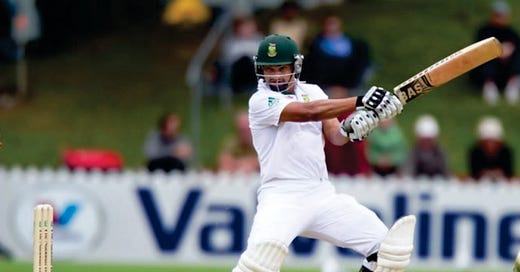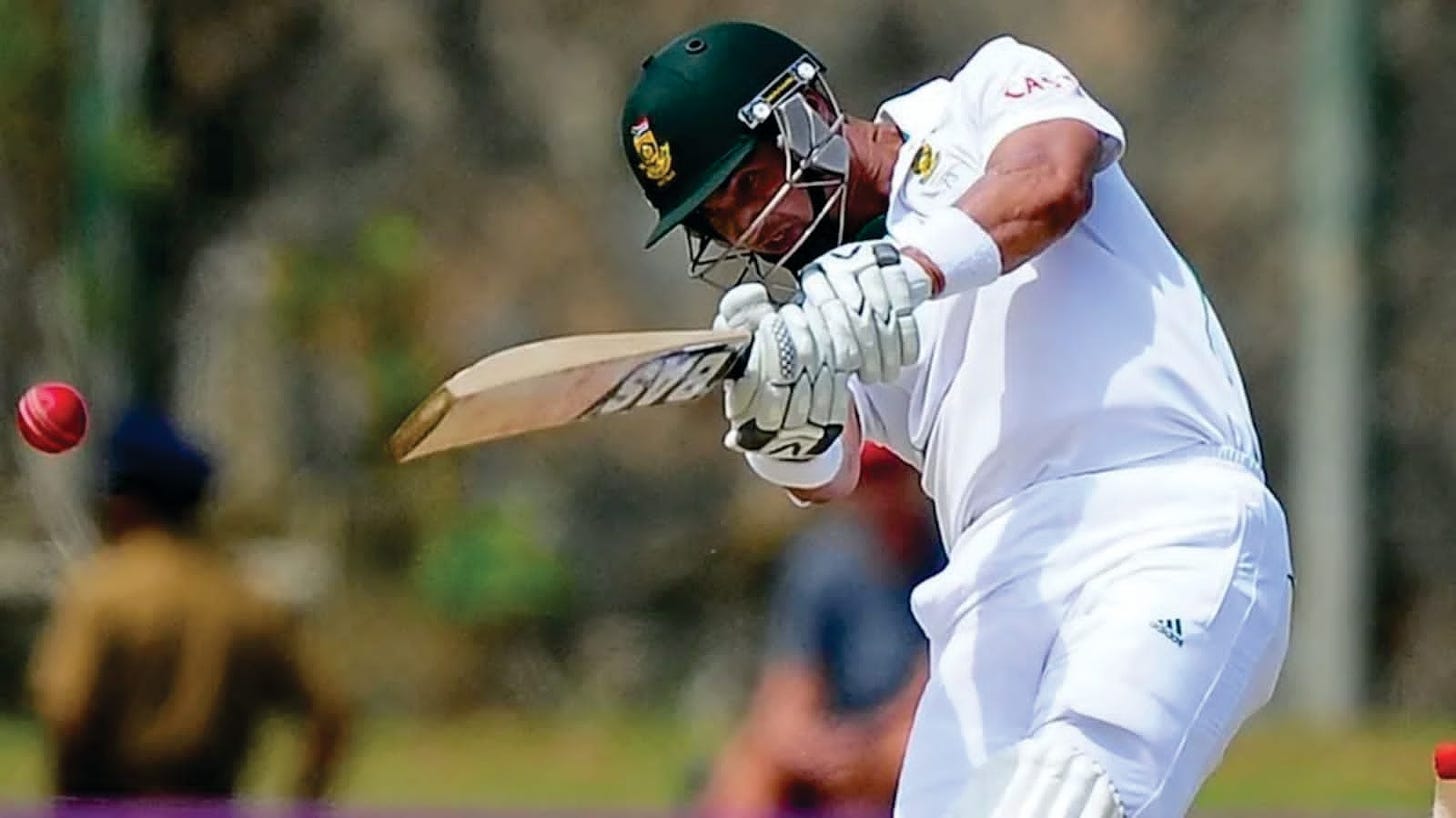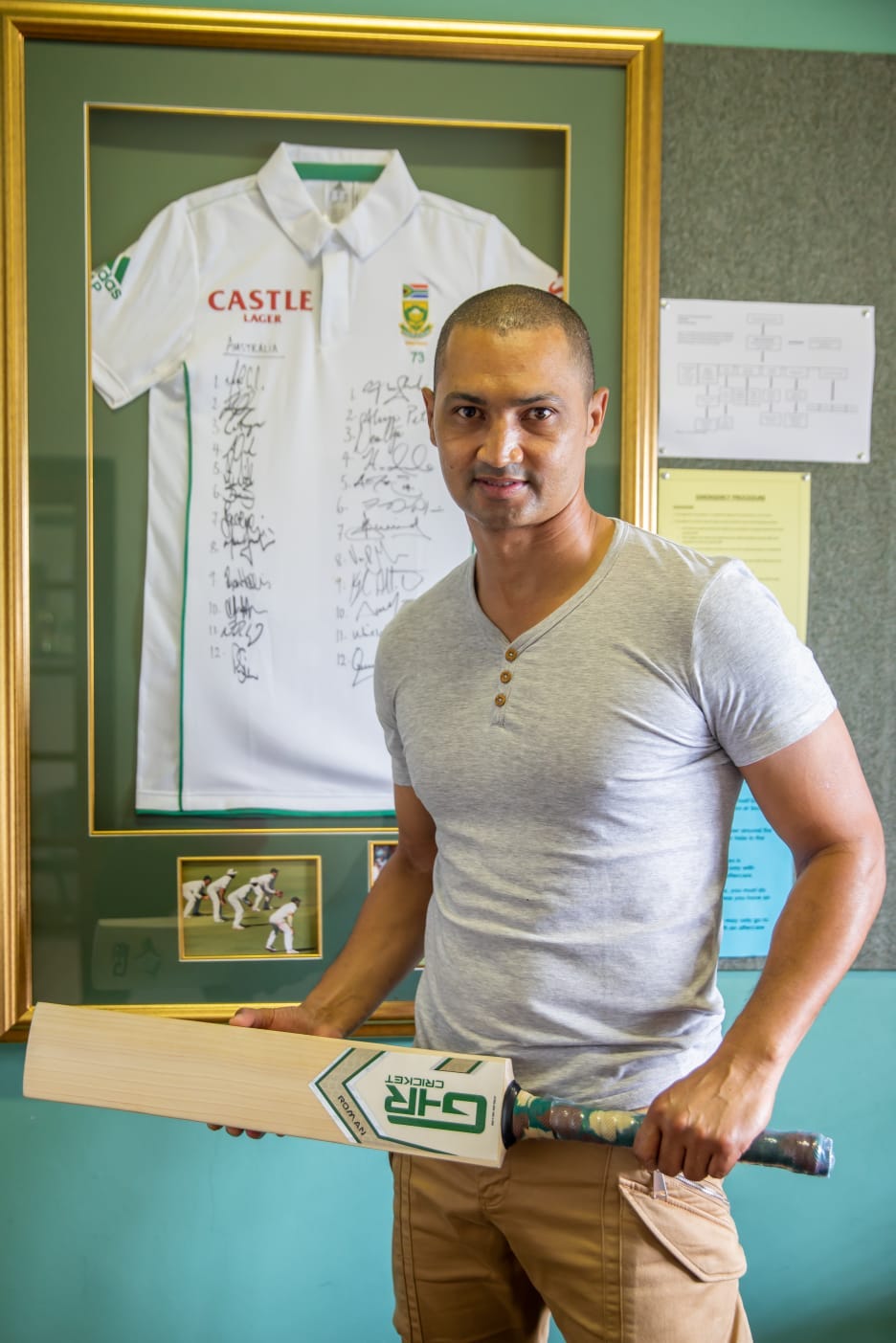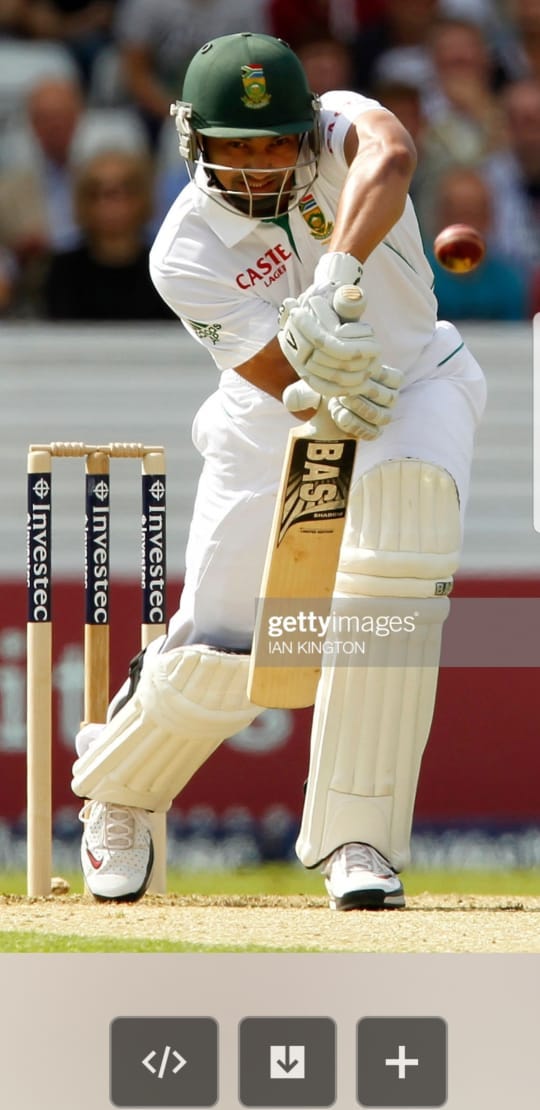Test Century on Debut: Alviro Petersen
It was more than just a hundred, it was a statement that he belonged here.
On February 14, 2010, Alviro Petersen became the 89th male cricketer to score a century on debut. After finding himself in a settled Proteas squad that couldn’t find a spot for him in the First XI, the century was a statement of intent: he wasn’t here to make the numbers.
Alviro Petersen understood the situation. It had been explained to him and the reasons given made a lot of sense. Alviro was included in the starting eleven on the eve of the second Test because Mark Boucher had sustained a back injury. He was in the squad only as a replacement player.
“It was made clear that I was in the team because of an injury, so, it's not a long term thing,” says Alviro.
This was a settled team, and he knew it. It would take a special innings to shake things up. And the stage was set; this was against India, at Eden gardens, in Kolkata. No easy feat, but he was going to put his best foot forward.
So, as he crossed the boundary rope onto the field of one of India’s top grounds, Alviro centered himself, he knew that this was the opportunity that the 8-year-old boy from Gelvandale had dreamed of. This is what he had been preparing for all his life.
The first time Alviro Petersen saw the Proteas walk out to play, he was 8 years old, and he knew at that moment that that was what he wanted to do with his life. The sight of that team, in their pressed whites, walking out to compete stirred something in him.
At the time, he was a student at an Afrikaans primary school, Fontein Primary School, Gelvandale, Gqeberha (formerly Port Elizabeth). And on the day, the school had sent school children on a field trip to St. George’s Park to watch a day of a Test match between South Africa and Pakistan.
“Our school offered to transport students to St. Georges Park to watch the Proteas play,” Alviro remembers, “however, the students had to purchase their own ticket to enter the ground, "
But, coming from a poor family, Alviro was one of the few kids whose parents could not afford the ticket fee, and had to stay behind at the school. Alviro Petersen’s mother was a factory worker, employed by Eveready - the battery manufacturing company - and his stepfather was a local taxi driver. There just was no money to spare for such a luxury at that time.
The only way he could watch the match was on the tiny black and white TV that the PE teacher had in his classroom. Every now and then, young Alviro would walk to the door of the classroom and he would peer in to check on the progress of the match. Not only that, maybe there was also a thought in his head that he might catch sight of some of his schoolmates at the stadium.
“And as I popped in I saw South Africa walk onto the field,” says Alviro, “and I said, that's what I am going to do. And I remember the PE teacher looked at me and laughed and said, ‘It doesn't happen to kids who come from this community.’"
Gelvandale is one of the many communities riddled by drugs and gangsterism. Not many children make it out of such communities, and much less made it out back then. One way or another, young kids found themselves falling into one of the two traps, or both. For many, there is no way out. Their world is within the borders of that suburb. The lucky ones at least experienced life in neighboring suburbs, towns and cities.
Put simply, life is a dead-end for many kids from such communities.
And this is a reality that Alviro Petersen is trying to change in the present. He is doing that through his foundation, The Alviro Petersen Foundation, which is putting children from Gelvandale through school and university.
“My foundation has put over 100 high school students through school,” Petersen shares, “by paying their school fees, and supporting schools and communities with equipment. Some are now studying to become professionals in various fields.”
And for the sport inclined children, they try to expand their world by giving them opportunities to compete with teams that are not just within the Gelvandale community. He strives to make their reality different from his - they should not just compete with kids a few streets or nearby schools away from theirs as he did as a child. So, they fly them out to Gauteng to play against private schools and clubs like Eersterust Cricket Club.
“That was the purpose of it,” says Alviro, speaking of his foundation, “to take people out of the community and say, ‘There's something bigger out there for you, if you only dare to dream? Don't just get caught up in this, there's something bigger for you.’"
He is keen to see young kids from his home town having bigger dreams than their surroundings. To expand their world from the confines of the northern areas of Gelvandale. For them, he has a different message to the one that his PE teacher told him when he was 8 years old.
“You might as well forget about that,” he was told by the teacher, who had seen enough to lose all sense of optimism and felt that his vision was a pipedream.
But the idealistic boy had remained unmoved.
"That's what I am going to do," young Alviro had replied with a manner that could either be seen as naïve bravado or self belief.
It wasn’t just self belief, it was that coupled with a strong drive. The kind of drive that drove him to go for a net session, with a petrol attendant from a nearby garage shooting balls at him, on Christmas morning.
“When I was at Northerns Academy,” Alviro Petersen recalls, “I actually befriended guys working at the petrol station, the petrol attendants, and one specific one I would say to him, ‘Here's 50 bucks, come and shoot to me in the indoor center.’"
It is the kind of drive that led him to break five First Class records in South Africa in a single season. Records that include the most runs in the season and the most hundreds in both innings in the same game. They were records held by players like Barry Richards, Peter Kirsten, Kepler Wessels and Martin van Jaarsveld. It was a feat that forced people to notice, sit up and pay attention to him as a player.
“I was in the frame of mind of, ‘I don't want to compete with another player of color. I want to compete with South Africa. I want to be one of the best,’" says Alviro.
That was the perfect frame of mind in response to what his coaches had told him. They had always told him, ‘If you want to be included in the Proteas, stop knocking on the door, you have to break the door down.’ And that is what he did, he took it off the hinges.
You see, Alviro Petersen had or has two things: an internal locus of control and intrinsic motivation. He is one of those people who believes that his success is dependent on the effort and work he puts in.
Intrinsic motivation has three main elements to it: the need for autonomy, the desire for mastery and a strong sense of purpose. He was determined to be the captain of his ship, to determine just how far he would go. He had the desire to be the best that he could be at what he did - as he shared, ‘I just did not want to be the best opener, I wanted to be the best batter, or one of the best, in the top five in South Africa.’ And purpose? Well, he really felt that he could show the others that there was a way out of Gelvandale and similar places.
In communities like Gelvandale, sport is an escape from the realities, a safe space.
“The club was like a brotherhood,” says Alviro describing the Gelvandale Cricket Club that he joined at the age of 12. “It was like a safe haven for people that come from the community where gangsterism and drugs were the order of the day. So that was almost an escape, sport being something that really united all of us.”
Of course, for someone like Alviro, it was much more than just a momentary escape, this was more than just a hobby. His hobbies were tennis, that he had played for years with wooden makeshift bats, and soccer - he captained the local club, Shatterproof Football Club and made the Eastern Province Under-15 soccer team as a center-forward.
“I played all sports,” Alviro recalls. “If there's a bat and a ball, or just a ball, we would find a way of playing something.”
That is what life was like for Alviro, a buffet of sports at school, at clubs and on the streets - something that he doesn’t see much of today. Anyway, those were his hobbies: soccer, tennis, hockey.
And cricket? It was much more.
Anyway, if his PE teacher had known about Alviro’s drive, he would never have told him that his vision to play for South Africa was a pipedream. Maybe if he had had a conversation with Alviro’s mother he would have known, or at least had an idea what kind of individual he was dealing with. I mean, not many kids possess the character and discipline it takes for one to raise enough money to buy a bat from selling pieces of chocolate.
“My mum was a factory worker, and they would get paid every Friday,” recounts Alviro. “So what I would do is, I would go and buy these broken chocolates from Cadbury. They are very cheap. I would buy them, put them in packets, and then I would give them to my mum and say, ‘Please go sell this at work.’ And she would. But if someone buys on a Monday or Tuesday or whatever, they would only pay on Friday.”
For weeks, this is what Alviro and his mother did, he would give her chocolates to sell, and she would sell to her colleagues on credit, and then collect payment on Fridays. Alviro would then reinvest into his little business and buy more chocolates, then it became chocolates and sweets until a point where he even added perfumes to the list. Eventually he raised a couple of hundred Rands and bought his first ever bat. It was a Laser bat.
He bought the bat from his Gelvandale Cricket Club teammate, Nigel Brouwers. A very talented allrounder who grew up to be one of the players to ever turn out for South Western Districts. That season Brouwers had been named the player of the year by Gelvandale High School, and they had rewarded his efforts with a brand new Laser bat.
“It was really a good bat, I scored a lot of runs with it,” Petersen smiles.
That bat laid the foundation for his career.
This was the kid that Alviro’s PE teacher did not see or had an idea existed. But it is the kid that Alviro never forgot or outgrew. When things got tough, he reminded himself of the 8-year-old kid who dared to dream. For instance, after his move to the Eersterust Cricket Club at 18.
Alviro joined the club on a R2000 a month, 3-month contract, as the professional batter. It was a huge responsibility. For a young man who had no family or relatives in Gauteng, it was a really daunting move. But it was a challenge that he took head on.
“I don't want to lie to you, it was really difficult moving away from home,” Alviro says. “You're moving away from your life and your support system, moving away from a hot meal in the evening. You know, mum would sort out a nice hot meal for you but now you have to sort it out for yourself. And that's where I really appreciated what my mum's done for me. So, moving up to Pretoria, at times it was lonely. And to make it through you have to dig deep. I knew that 8-year-old boy inside of me that said, ‘That's what I am going to do.’ That's what really drove me.”
There were many other moments when he had to summon the memory and drive of that 8-year-old. When he had to lead Glamorgan as captain and overseas batter through a difficult time. When he had to withstand the media onslaught each time he had a bad innings or game. When he had to remind people that he belonged and was not where he was because he was a quota - and he did a lot of that in his career. Because being a player of color, he was often held to a higher standard.
"A lot of times I had to make a point and remind people, ‘I'm going to show you why I am playing in this team. There's a reason why I am playing, and the reason is that I am good enough. I am playing because I score runs, and I score big runs.’"
One of the many instances that stand out in his mind is the Proteas tour of England in 2011.
“Remember when Hashim Amla got his 300 at the Oval?” Alviro shares. “The scorecard read: Graeme Smith and myself, we opened. Graeme got a 100, I got a duck. Hashim got 300, Kallis got a 100. And I remember the media, they were all over the show saying, ‘He must be dropped. Someone else must get an opportunity. It's time he must make way.’ They were effectively saying that this was it, I was not good enough, and had to be dropped."
The most curious thing about the calls for Petersen to be dropped after the 1st test against England was the fact that in the test match before he had managed scores of 150 and 40 in the first and second innings. However, it seemed as if everyone was suffering from short-term amnesia, and had conveniently forgotten about that. So, he had to remind them again.
Fortunately he was given another opportunity in the next Test at Headingley, Leeds. South Africa was batting first, and Alviro put on a show with wickets falling around him. South Africa closed the day on 220/5, with Petersen on 120 not out. He eventually put up a mammoth 182.
“I had to do it a few times in my career,” says Alviro.
A career laden with quite a number of local and international firsts. Alviro was a world record holder for scoring the most centuries in a row in limited overs cricket; the five First Class records; becoming the only player in the world to score a century on test debut, take a wicket in his first over of test cricket and bowl a maiden in his first over of test cricket.
Petersen won awards at Glamorgan, Lancashire (for whom he recorded one of the highest partnerships of 501 runs with Ashwell Prince, in 2015, against Glamorgan), Gauteng Lions and every other team he turned out for. In 2010, he was named a Mutual and Federal SA Cricketer of the Year.
Of course, Alviro Petersen did not do it all alone. Notwithstanding all his self belief and drive, he could never have made it alone. And during that period in England he had the backing of Gary Kirsten, who believed in him.
“Gary Kirsten said to me, ‘Listen here, I know they are saying, people within the media saying we must drop you. But I back you because I know you can score hundreds, and you can score big hundreds.’”
Dave Nosworthy, who was with him at the Titans, and then later at Lions, is another coach whom he feels helped him along his journey. He showed him trust and belief. Then there is also Geoffrey Toyana, whom he teamed up with at Lions.
In addition to the coaches, Alviro is grateful to people like Nigel Brouwers and others who all played a part on his journey, from his teammates at Gelvandale to the petrol attendants who were willing to shoot balls to him. Most importantly, he is forever grateful to his mother for all she did to not stifle the dream that 8-year-old Alviro had. She nurtured that dream. The dream that others had laughed at and considered a pipedream. The dream that was realized 20 years later when he walked out to bat against India at Eden Gardens alongside Graeme Smith.
Thank you to everyone who has shown their appreciation of my work and this newsletter. I am entirely freelance and have no intention of putting content behind a paywall. However, for me to be able to continue producing more content, I depend on your patronage. So, please do support my work on Patreon.
Alternatively you could Buy A Coffee.
Also, please encourage anyone whom you think may be interested in my work to subscribe.








